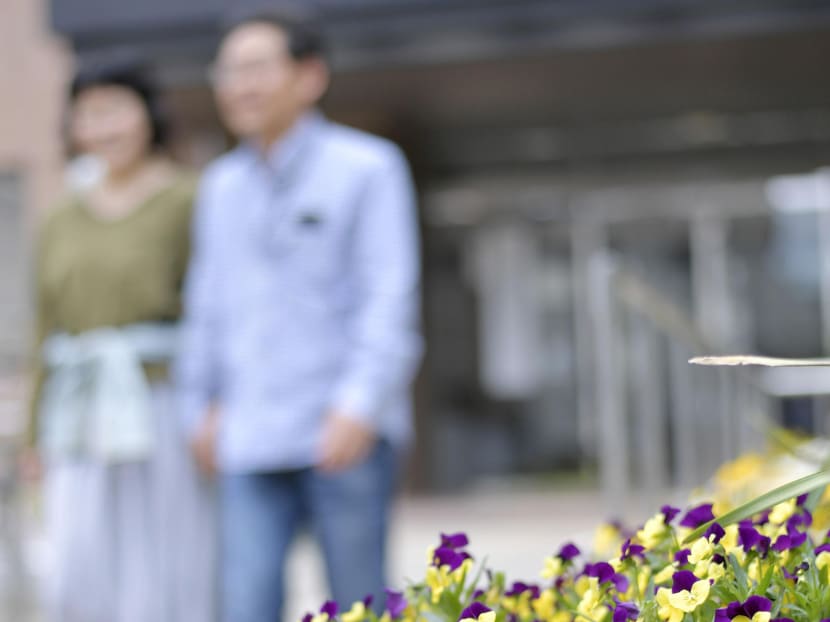When it comes to marriage, more Japanese say better late than never
TOKYO — Proving there is no age limit to marriage or romance, a growing number of Japanese from their late 40s to early 50s are tying the knot, some for the first time.

Hiroyuki (R) and Keiko (not their real names) walk side by side in May 2017. The couple got married, the first time for both of them, aged around 50, part of a growing number of people in that age group in Japan who are tying the knot. Photo: Kyodo
TOKYO — Proving there is no age limit to marriage or romance, a growing number of Japanese from their late 40s to early 50s are tying the knot, some for the first time.
Driven by a desire for a romantic relationship, many people who lived through Japan’s asset-inflated “bubble economy” from the late 1980s to early 1990s want to enjoy the present moment amid increasing global economic uncertainties and are turning to marriage as the way to go.
This is happening while the overall number of marriages in Japan is declining, according to the National Institute of Population and Social Security Research.
In 2015, 2,950 men aged 50-54 tied the knot for the first time, 4.7 times more than in 1990, while the number of women doing so doubled to 1,169, the institute said.
Men marrying for the second time in the same age bracket totalled 7,710, 1.6 times higher than the 1990 level. The figure for women more than doubled to 6,222.
A 51-year-old man, Mr Hiroyuki (not his real name), who holds a management-level position at a major firm in the Kanto region around Tokyo, said he married when he was 49. It was the first time for both him and his wife, Keiko (also a pseudonym), who is the same age.
Mr Hiroyuki said he was so busy with work during weekends that he had no time to meet women outside of work. Given his senior position, he was hesitant to seek potential marriage partners among women in his office until he realised he was hitting 50.
TURNING TO MATCHMAKERS
His colleague invited him to register with a marriage consultancy firm. He first sought a young woman, but eventually hit it off with Ms Keiko. Mr Hiroyuki said he felt at ease with her and was drawn to her fun-loving personality.
She initially wanted to balance work and family, but later quit her job to live with him.
He now comes home early and mingles more with their neighbours. Having a child may be difficult for the couple, but that means he does not need to worry about added expenses in raising a child.
The couple said they enjoy their respective hobbies, travel and spending time together.
For them, marriage came at just the right time. “If (we were) young, we would have been putting all our efforts into simply making a living. We are glad we married at this age.”
Marriage consultation centres not only attract first-timers, but those who want to give it another shot once their children become independent. Men are mostly looking for a new life after retirement, while women are seeking financial support.
Last month, Tokyo-based centre Nozze sponsored a matchmaking event in Yokohama near the capital.
Among the attendees was a 54-year-old woman, who had divorced her husband five years ago due to his violence.
“At one point, I just did not want to be married any more, but (now) I want someone with whom I can confide in,” she said.
Another participant, a 57-year-old man and a three-time divorcee, said “marriage is good”, and added that he hopes to financially support his potential partner.
“BUBBLE GENERATION”
Ms Megumi Ushikubo, a marketing writer, draws attention to the fact that over-50s comprise the “bubble generation” who lived in an era of high economic growth.
“(This generation) grew up watching television dramas about romance and thus have a strong mindset that romance is the most wonderful thing in the world,” Ms Ushikubo said.
She said that people who experienced the bubble period believe that if they work hard, they should be rewarded, and also had “unfounded confidence that even if times are hard now, things would get better”.
Noting that marriage has changed over the years, Ms Rika Kayama, a psychiatrist, said: “It is no longer about giving one’s life to another person, but rather being an emotional support (to another) or adding spice to one’s life.” KYODO






